Champions in Leadership
By Pete LaFleur
The University of Notre Dame’s rich athletic heritage has been fashioned by countless student-athletes, coaches and support personnel whose tireless efforts have left a lasting impression throughout the nation, and beyond. In the 12 decades since Notre Dame played its first varsity football game, the University’s athletes have excelled on a wide variety of levels, keeping in line with the school’s mission of developing well-rounded and community-minded citizens.
This week’s article pays tribute to special members of several Notre Dame athletic teams (and even a key support group, the cheerleading squad), many of whom received Notre Dame’s Francis Patrick O’Connor Award. The O’Connor Award annually recognizes student-athletes whose leadership manifested itself in “contributions and inspiration to their teams,” with traits such as “caring, courage, confidence, encouragement, humility, humor, honesty, kindness and patience” among the nominating criteria. Nearly one-fourth of the O’Connor Award recipients (7 of 31) have been African-Americans, beginning with the first two honorees in 1993 (women’s basketball point guard Coquese Washington and baseball outfielder Edwin Hartwell), followed by men’s soccer players Jean Joseph (’95) and Reggie McKnight (’95), leprechaun mascot/cheerleader Michael Brown (’01), football player Grant Irons (’02) and men’s basketball guard Chris Thomas (’05).
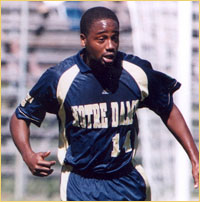
Reggie McKnight
|
McKNIGHT has kept leadership and academic success at the forefront of his life, due in large part to the guidance of his parents, Richard (retired from the Lockwood Green engineering and architectural firm) and Lela (director of guidance at the South Carolina Governor’s School for Arts and Humanities). “My parents instilled in me the understanding that academic excellence was not a choice, but a responsibility to honor those who have sacrificed for me and on whose shoulders I stand, and to those who will one day stand on my shoulders,” he says.
“They also showed me that education makes it possible to transcend barriers and achieve one’s God-given potential. My parents helped me to stay focused on my goals, always honoring the ideals of faith, service to others, community and sacrifice. All of this comprises the values that have defined my parent’s lives.”
True to form, McKnight’s siblings have helped mold their brother, through constant “encouragement, advice, and being models of academic and professional excellence.” His older brother Richie is executive director and counsel for Morgan Stanley in New York, while their sister, Dr. Lela McKnight, is a clinical psychologist and mental illness epidemiologist at the CDC.
Plenty of academic mentors were awaiting the Greenville, S.C., native at Notre Dame, including Jack Pratt, former associate dean of the law school. Pratt was one of primary advisors to McKnight during his application process for the prestigious Rhodes Scholarship. McKnight went on to attend Duke Law School, where he earned the full-tuition Mordecai Scholarship by virtue of his merit, character and leadership. He served on the executive board of Duke’s Moot Court and, after graduating in 2004, went to work in Washington, D.C., as a litigation associate for Dickinson Shapiro LLP – where he received the firm’s Justin Simon Core Values Award and served as professional development chair for the Washington Bar Association (young lawyers division), in addition to being co-chair of the D.C. Bar Criminal Law and Individual Rights Section community outreach committee. McKnight currently serves as a law clerk to the Honorable Karen J. Williams, chief judge for the U.S. Court of Appeals for the Fourth Circuit.
“In my career, I apply the same focus, determination, and ability to deal with adversity that I learned at Notre Dame,” says McKnight, an invited participant in the 1999 NCAA Leadership Conference. “I always look for opportunities to engage in public service as an attorney. I still am close to many of my soccer teammates and recognize the importance of personal relationships in my current career.”
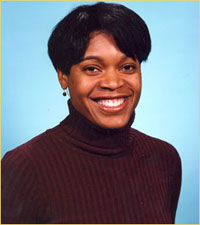
Coquese Washington
|
WASHINGTON, like McKnight, was one of the top players on her team at Notre Dame and similarly pursued a career in law, following up her three-year graduation from Notre Dame (in ’92, with a degree in history) by receiving a 1997 law degree from her alma mater. Her six-year professional basketball career – spanning stints with the ABL’s Portland Power, and the WNBA’s New York Liberty, Houston Comets and Indiana Fever – actually provided the chance to put that law degree to work, as Washington helped found the WNBA Players Association and was president of the WNBPA from 1999-2001. Her leadership helped produce collective bargaining agreements and the first free-agency system ever in a women’s professional sports league.
After serving eight seasons on the Notre Dame coaching staff, Washington was tabbed, in 2007, as the first African-American head coach at Penn State in any women’s sport. Her peers have praised her coaching strengths, some noting a deep passion and respect for the game while others appreciate her combination of having a calm, analytical demeanor along with the ability to think quickly on her feet. Washington’s background as a professional player – where she made a name for herself an aggressive, yet intelligent, player – also could serve her well in the head coaching ranks.
“So many of my experiences have shaped me, most notably through becoming a leader in different situations and professions,” says Washington, who played alongside WNBA legend Cynthia Cooper on the 2000 Comets team that won the WNBA title. “I’ve benefited from having different leadership perspectives, and law school even can translate to coaching due to the problem-solving lessons you learn”
Washington – who honed her ballhandling skills growing up in Flint, Mich. – gives early credit to her family for stressing time-management and a “studies first” policy. Now the parent of a two-year-old son Quenton (alongside her husband, Raynell Brown), Washington appears to be drawn to a life of making a positive impact on young people.
“I’m a firm believer in teaching, coaching and using positive motivation. I love seeing the maturity and growth come about in young players,” she says. “I recognize that I will be a role model for other African-Americans. I hope that’s the beginning of something positive.”
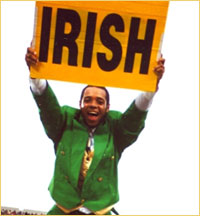
Michael Brown
|
BROWN easily rates as one of Notre Dame’s most-popular leprechauns, due to his boundless energy, contagious spirit and a magnetic ability to connect with fans of all ages. His first two years on campus included serving as a spunky tailback on the O’Neill interhall football team, while also becoming a legendary fan in the student section at Notre Dame Stadium. Brown’s constant cheering and crowd “body-surfing” prompted his roommates to suggest their friend take a shot at leprechaun tryouts.
A few months later, Brown’s inspiring audition made him the first African-American leprechaun ever at Notre Dame and he filled the role of spirited mascot/ambassador during the 2000 and ’01 football seasons, plus Irish basketball games and alumni functions. His busy four years at Notre Dame also included intramural basketball and inner-tube water polo, singing with the Voices of Faith Gospel Choir, and founding a multicultural music/dance group called the First Class Steppers (patterned after Stomp).
Brown’s strong faith and support of his family – mother Andrea, grandmother Lorraine, and sisters Michelle and Kasheena – helped him emerge from a challenging environment in Milwaukee’s North Meadows housing complex. He was a two-year starting quarterback on the Vincent High School football team and led the team to the state quarterfinals as a senior, months after serving a valuable summer internship at nearby M&I Data Services. It was there that the academic-minded Brown crossed paths with Notre Dame alumnus Michael Peterson, who helped guide the future leprechaun’s college choice.
After graduating with his degree in management, Brown returned home to accept a full-time position as a technical application developer with Metavante Corporation (where he had interned as an undergrad). He recently was promoted to sales product specialist and has relocated to Chicago, after marrying Notre Dame classmate Jaymie Garcia. Brown also received a masters of science in management from Cardinal Stritch University (’06), served three years as a young alumni director on the Notre Dame Alumni Association’s board of directors, and is an active member of the INROADs Alumni Association and the Windy City Toastmaster’s club, while continuing to serve as a guest speaker at schools and other organizations, including Rockwell Automation Black History Month.
“For me, leadership has always been about taking initiative, being proactive and pursuing things you love,” says Brown. “I believe great leaders have a clear vision of success and positive outcomes.
“Fr. Hesburgh said it best: ‘The very essence of leadership is having vision.’ That vision can be applied to all aspects of life and I owe it to myself to have a vision – of course, turning it into action is the key.”
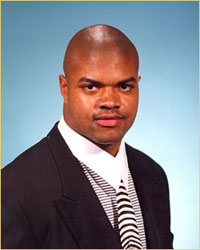
Grant Irons
|
IRONS made an indelible impact throughout the Notre Dame community, spanning a five-year career that ended in 1991. Despite multiple injuries and position switches, Irons proved to be a true leader through his unwavering positive outlook and constant care for others.
Most people on campus for Notre Dame’s 2000 football season will never forget the image of Irons pedaling his bike (with gold football helmet firmly strapped on) from the stadium lockerroom to the practice field. This daily sight always was accompanied by a trademark Chesire grin on the face of the chiseled 6-5, 280-pound lineman.
One aspect of that visual image that many may forget is the fact that Irons was sidelined with a shoulder injury for most of the 2000 season. He was not required to attend all of those practices, or the corresponding team meetings. But Irons was there every day, like clockwork, even donning his helmet on the sidelines while cheering on teammates at practice (and sometimes pumping a 25-pound dumbbell with his left arm).
“Most guys, if hurt, wouldn’t be at practice,” said former teammate Lance Legree. “Grant stayed with us every day. I respect him a lot for that.”
Despite the absence of Irons, the 2000 team reeled off a seven-game win streak following a devastating loss to Michigan State. Later that season, many players credited the turnaround to an inspirational speech that Irons gave following the MSU loss.
“You can show leadership in many ways and adversity was not going to prevent me from helping my teammates. I wanted to continue encouraging and keep them focused,” says Irons, who ultimately served as a rare two-year captain with the Irish.
Teammate Darrell Campbell at the time praised Irons for his attitude and “great heart,” adding, “Grant sparks something in all of us, making everyone confident and in-tune with the game. Grant not only leads by example, but by words and emotion.”
That sense leadership extended to a simple sense of duty. Irons evolved into a reliable team spokesman – available to the media, regardless of situation – and regularly was the final player to leave autograph sessions, clearly setting him apart from teammates who shunned media requests and set aside a minimal amount of time for fans.
Irons currently is looking to reconnect with an NFL team, as a free-agent defensive lineman who previously played one season with the Buffalo Bills and spent several years with the Oakland Raiders. He naturally has made a wide-reaching impact in his “adopted community” of Oakland.
“I try to live by biblical scripture, ‘To Whom Much is Given Much is Required’ and much of my service spirit is because of leadership programs at Notre Dame,” says the ever-humble Irons. “The Notre Dame family is special and you can’t help but have it make a positive impact on your life.”
While growing up in The Woodlands, Texas, Irons was inspired by the work ethic and loving advice of his parents, Gerald and Myrna. The young Irons followed in the footsteps of his father (a 10-year NFL player, with the Browns and Raiders, in addition to being a University of Chicago law-school grad) and his brothers Gerald, Jr. (a noseguard at Nebraska) and Jarrett, an All-America linebacker at Michigan.
Prior to attending Notre Dame, Irons received the Watkins Memorial Trophy (given to the nation’s top male African-American scholar-athlete) and the Dial Award, as the nation’s top high school scholar-athlete – in addition to being considered one of the elite high school players in the country. He went on to serve as vice-president of Notre Dame’s Student-Athlete Advisory Council and was one of 11 Division-I football players named to the 1999 Good Works Team.
Irons should have plenty post-football options, as he earlier was invited to join GE’s Incoming Leadership Program (the NFL put that option on hold). Already a real-estate investor and aspiring businessman, Irons also may give TV commentating a shot after his playing career. His resume includes three college degrees (management information systems, management, and MBA; all from ND) and a special connection with investment wizard Warren Buffet, a mutual friend of Notre Dame benefactor Tom Mendoza.
Buffet – like so many others – has been impressed with Irons, telling the Buffalo News in 2002 that the man known by many Irish fans as “G.I.” is a “first-class, decent guy” bound to be “a success no matter what he does – he has a good attitude toward life and handles himself well.”
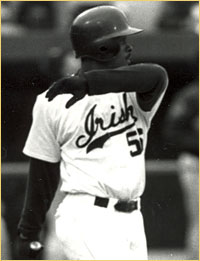
Edwin Hartwell
|
HARTWELL fashioned his own “Rudy” story at Notre Dame, earning a walk-on roster spot with the Irish baseball team in 1990 and struggling to crack the lineup in his first two years – before a solid junior season and then a breakout senior campaign that saw him serve as the squad’s lone captain and compile a .447 season batting average (still tops in the Notre Dame record book). He later played briefly in the San Francisco Giants organization before, at 23, becoming the youngest assistant director of scouting in Major League Baseball, with the newly-formed Arizona Diamondbacks (in ’95).
“Some people thought I was crazy due to the reduction in income, but as a leader you always are looking for the next challenge,” says Hartwell, a business administration major Notre Dame, who received the Distinguished Student Award (for undergrad service to the university) and the Friendship Society Award.
“I helped maintain a $5-million scouting operation along the west coast while also managing our Latin American scouts and helped develop a facility in the Dominican Republic that housed 50 players. Baseball scouting is such a team effort and there is very little individual credit for signing players. Our scouts and crosscheckers would huddle in a room and scream at each other, but eventually we’d come to a consensus and choose the best players. In that type of atmosphere, you really see true leadership.”
After three years with the Diamondbacks, Hartwell relocated to Atlanta to join his former boss in Arizona, Don Mitchell, as co-founders of the GAAMES sports agency. After three years of growing their business, GAAMES merged with Gaylord Sports and Hartwell was off to another challenge, starting a career with the nation’s largest real-estate firm, Newmark Knight Kirk (he specializes in tenant representation for class-A office space, debt/equity and municipal financing).
The Texas native, as the son of two teachers, grew up in an atmosphere where “leadership was expected and taught at a very young age.” He later benefited from attending Fort Worth Country Day High School and was exposed to a number of leaders – among them Brad Corbett (former Texas Rangers owner) and financier Richard Rainwater – “who became successful because they chose to follow their own path,” with Hartwell’s own path ultimately landing him in northern Indiana.
“Attending Notre Dame was the best choice I ever made,” says Hartwell. “On the baseball team, I learned so much about having an even-keeled approach and I saw the importance is overcoming adversity. I also learned from the older players and took the responsibility to pass on those lessons to the younger guys.
“At Notre Dame, I met my wife [Adanna Fails, who is expecting the couple’s second child in March] and I roomed with the same guy, Andrew Lawrence, in Carroll Hall for four years. Andrew still is my best friend and he and my wife are my support base, those who I trust when I need help. I never would have met them without going to ND and would be a totally different person today.”
JOSEPH continues to be praised by former teammates for steady inspiration and leadership throughout his career, particularly as a veteran who always looked out for the newcomers to the program. A prep All-American from Marietta, Ga. (where he was state player of the year), the technically-skilled Joseph went on to have an impressive freshman season in 1991, earning second team all-conference while posting the third-most points (28; 11 goals, 6 assists) ever by a Notre Dame freshman. The finance major recently has been juggling a more challenging task, while working in New York City for Goldman Sachs.
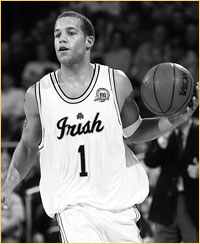
Chris Thomas
|
THOMAS – the most recent O’Connor Award recipient in this piece – is well-known to Notre Dame fans, as a spirited four-year starting point guard. Following his 2005 graduation with a degree in economics, the Indianapolis native embarked on a professional basketball career in Europe and currently is playing in Spain.
BILL TAYLOR is entering his second season as head basketball coach at Ball State, following a five-year run at Lehigh that included a trip to the 2004 NCAAs. He previously was the top assistant for three seasons at North Carolina-Greensboro, on the staff of former Notre Dame assistant coach Fran McCaffery (UNCG played in the ’01 NCAAs and ’02 NIT). Notre Dame’s team captain as a senior, Taylor graduated in 1995 with degrees in accounting and computer applications, in addition to earning his CPA in 1998. He then served on John MacLeod’s Notre Dame staff in 1998-99 and caught the “coaching bug.”
“I had been working in accounting and coaching was not in my plans,” says Taylor, whose Ball State program is founded on principles of character, commitment, mental toughness and dedication. “The coaching experience at Notre Dame strengthened my desire to make a significant impact in young people’s lives. I never knew coaching could be so fulfilling and rewarding.
“One of the lessons I took away from Notre Dame is a holistic approach to the development of the student-athlete. I believe very passionately in educating, developing, and preparing student-athletes for future success and leadership.”
Taylor also credits McCaffery with helping shape him “as a leader, educator and coach, through his trust and advice.” His earliest forms of leadership were nurtured by his parents, Dennis and LaVerne, who have defined his values “as a man, father, and husband.” Those traits then were strengthened during the Aurora, Ill., native’s undergraduate years.
“Notre Dame continually taught and challenged me, while presenting opportunities for development,” says Taylor, now a proud father of three alongside his wife Avlon. “The connected experiences from people like Fr. Bill Seetch, coach MacLeod, professor Milani, classmates and alumni helped make my leadership abilities evolve and blossom. I learned that a disciplined, structured approach can produce balance and growth.”
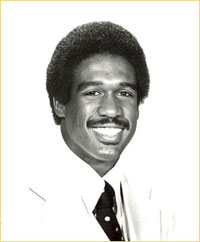
Gene Smith
|
GENE SMITH is in his fourth year as athletics director at Ohio State, after holding the same position at Arizona State, Iowa State and Eastern Michigan. The Cleveland native has been named by Black Enterprise Magazine as one of the “50 Most Powerful African-Americans in College Sports” and in 2007 was president of the Division 1-A Athletic Directors Association. He also serves on the prestigious NCAA Men’s Basketball Committee and recently become the first African-American president of the National Association of Collegiate Directors of Athletics. Smith was a defensive end on Notre Dame’s 1973 national-championship football team and graduated in 1977, with a degree in business administration. He was a member of the Irish coaching staff from 1977-81 and held a marketing position with IBM before entering athletics administration at EMU.
Former Irish basketball player Stan Wilcox is a member of the senior athletics administration at Duke, following three years as deputy athletics director at Notre Dame, 11 years as an associate commissioner of the BIG EAST Conference and earlier five years as an NCAA legislative assistant. The North Babylon, N.Y., native is a recent president of the Black Coaches Association (BCA) and is a 1988 graduate of the Brooklyn Law School. He was a freshman guard on Notre Dame’s 1979 NCAA Final Four team and played in 100 career games, before graduating in 1981 with a degree in economics.
Bob Minnix, the Irish football team’s leading rusher in 1971, similarly is a former president of the BCA and was the NCAA’s director of enforcement from 1975-95, before becoming Florida State associate director of athletics for compliance. A native of Spokane, Wash., he received his law degree from the University of Washington in 1975.






